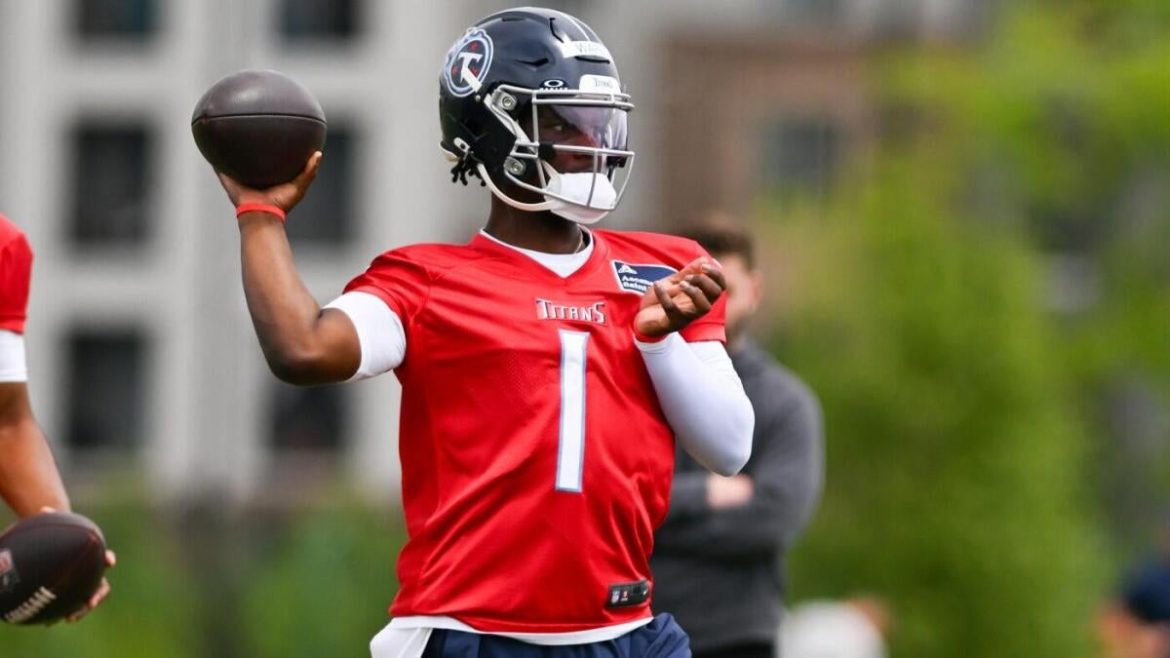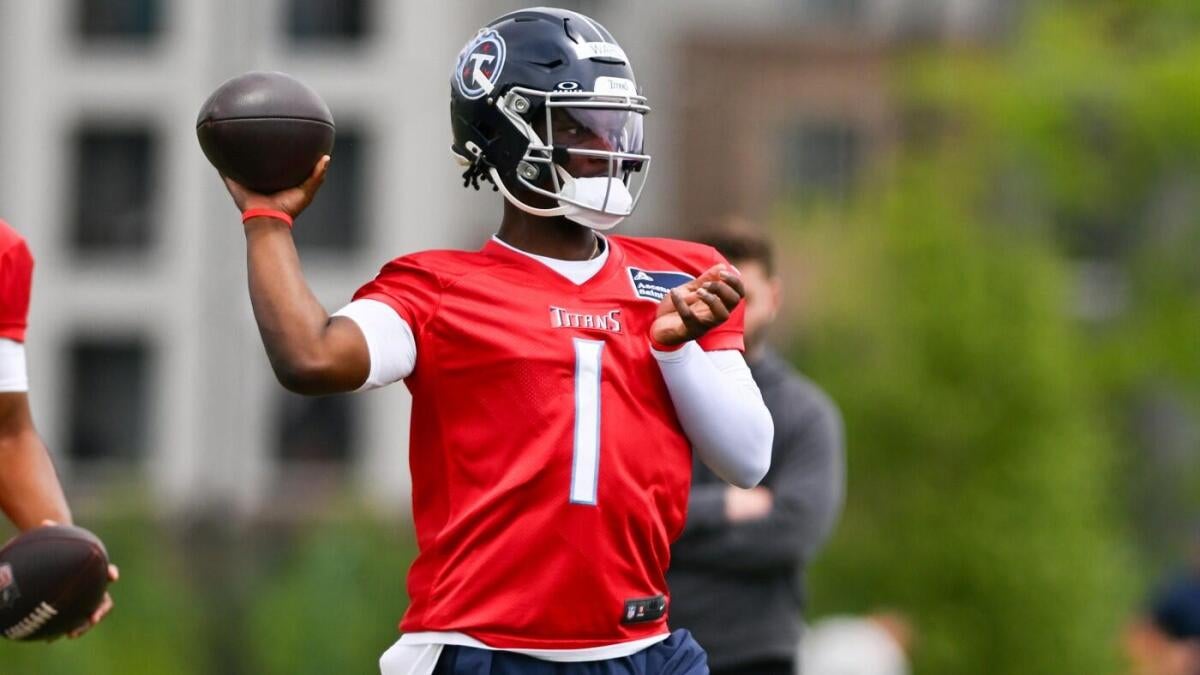The 2025 NFL Draft quarterback class, led by top prospects Cam Ward and Shedeur Sanders, is generating considerable buzz and speculation, with analysts, fantasy football enthusiasts, and NFL teams alike eagerly debating their potential rookie season outcomes. The discussions revolve heavily around best- and worst-case scenarios, team fits, and how their skill sets translate into the NFL. This analysis synthesizes current insights and projections to offer a detailed outlook on these quarterbacks’ trajectories in 2025.
Context and Quarterback Rankings: Cam Ward and Shedeur Sanders at the Forefront
Cam Ward from Miami and Shedeur Sanders from Colorado emerge consistently as the foremost quarterback prospects in the 2025 draft. Ward, praised for his prodigious college production, throws for over 4,600 yards and 47 touchdowns in a standout season, highlighting his capability to carry a team’s offense. Sanders, who amassed the second-most passing yards among FCS players, is lauded for his pocket presence and poise, although some evaluators see him as more of a pocket passer compared to Ward’s dynamic playstyle.
There is a widespread consensus that Ward may claim the title of the top quarterback on the board, but Sanders remains a compelling and possibly superior prospect in some rankings. Analysts like Bucky Brooks have even positioned Sanders over Ward in their top five positional breakdowns. These rankings reflect deep dives into game film, advanced statistics, and physical traits, underscoring the nuanced debate about who should go first overall.
Best-Case Scenarios: NFL Breakouts and Immediate Impact
For both Ward and Sanders, the best-case scenario involves immediate starting opportunities combined with strong organizational support. Reports indicate that Cam Ward is nearly assured to start Week 1 for the Tennessee Titans, a significant advantage for a rookie quarterback’s development trajectory. This opportunity aligns Ward with teams ready to invest heavily in supporting him with quality offensive weapons and coaching staff willing to nurture his potential.
Fantasy football models project Ward as a candidate to score high in rookie quarterback fantasy points, reflecting the explosive upside his skill set offers. PFSN’s season and playoff predictive tools paint a promising outlook if Ward can succeed in early NFL snaps, while comparisons are drawn to successful rookie passers such as Joe Burrow and Justin Herbert, who made swift impacts in their first seasons.
Similarly, Shedeur Sanders’ best-case scenario involves landing with teams willing to adapt their offense around his strengths. Although some franchises may hesitate due to questions about his athleticism versus Ward’s, Sanders’ refined pocket passing and decision-making could thrive in a system emphasizing timing and short-to-intermediate throws. Analysts highlight his potential to silence doubters by quickly proving readiness in year one, especially if placed in a nurturing quarterback-friendly environment.
Worst-Case Scenarios: Developmental Roadblocks and Team-Mismatch Risks
The rookie NFL quarterback path is perilous, and worst-case scenarios for Ward and Sanders revolve mainly around poor team fits and limited playing time. The most recurring concern is landing with franchises that are either unstable or possess entrenched starters blocking immediate opportunities. For example, Ward’s progression could falter if offensive line issues or coaching changes stall his development, or if the Titans fail to surround him with adequate talent.
Shedeur Sanders faces risks of landing in what many analysts consider the worst landing spots for rookie QBs, where complex offenses or defensive-minded coaches slow rookie integration. Reports mention visits to teams like the Raiders and Steelers, where his fit is rated poorly, potentially impeding his learning curve.
From a fantasy perspective, worst-case outcomes include minimal playing snaps leading to negligible rookie season contributions, relegating these rookies to long-term project status. Analysts forecasting these scenarios underline the volatility of rookie QB performances based on situation alone, emphasizing that talent does not guarantee immediate success at the professional level.
Team Fit and Opportunity: Determining Developmental Success
A critical factor in rookie success is the team environment. The Titans’ commitment to Ward, including willingness to invest significant draft capital and coaching staff praise, positions him well for a strong start. Conversely, Sanders’ situation is more fluid, with his fit heavily debated across NFL front offices and media outlets.
Teams evaluating Sanders seem split between recognizing his first-round talent and concerns about his immediate NFL readiness. This divide influences where he might fall in the draft order and the type of offense he will inherit. Analysts recommend that Sanders hopes for a quarterback-friendly scheme featuring strong supporting casts to maximize his development.
Other quarterbacks in the class face even more challenging paths, emphasizing that within this rookie QB group, the best chances for early success clearly align with favorable team situations, quality coaching, and offensive continuity.
The Imprint of Advanced Metrics and Film Study
Statistical analyses add layers to understanding these prospects. For instance, Sanders’ high rate of yards gained after the catch signals a potential dependency on receivers’ ability to make plays rather than consistent pocket passing. Comparisons show he differs from other top prospects by relying more on post-catch gains than traditional passing dominance.
Ward’s prolific college production, especially in a high-volume passing system, raises questions about adaptation to the NFL where defensive speed and sophistication increase dramatically. Film study highlights both have aspects requiring refinement: Ward’s need to master NFL speed and reading complex defenses, Sanders’ consistency and ability to command the pocket under pressure.
Fantasy Football and Dynasty League Implications
Fantasy football commentators and dynasty enthusiasts closely monitor these rookies, as early draft positioning and rookie year output significantly influence dynasty valuations. Ward’s promise of immediate starting duties makes him a coveted figure for rookie drafts, while Sanders offers high potential if drafted by forward-thinking organizations.
Worst-case talent depreciation or situational setbacks incur substantial dynasty value loss, making team draft strategy critical. This dynamic reminds managers that upside must balance realistically with team context for rookie quarterbacks.
Conclusion: A Tale of Two Copious Potentials
The 2025 NFL Draft quarterback class is headlined by Cam Ward and Shedeur Sanders, two gifted prospects whose rookie futures hinge dramatically on circumstances beyond pure talent. Ward looks positioned to start immediately in Tennessee, giving him a prime platform for potential NFL stardom, both contributing to the team and exciting fantasy football rosters. Sanders, while slightly behind in draft board consensus, remains a polished pocket passer capable of flourishing if paired with a supportive NFL environment.
Both rookies illustrate the delicate balance of potential and circumstance that defines NFL quarterback success. Their futures, shaped by starting opportunities, coaching, supporting casts, and personal growth, promise captivating narratives for the 2025 season and beyond. As teams finalize draft day decisions, the dichotomy of best- and worst-case scenarios for these young quarterbacks encapsulates the thrilling uncertainty and hope fueling each new NFL draft class.





